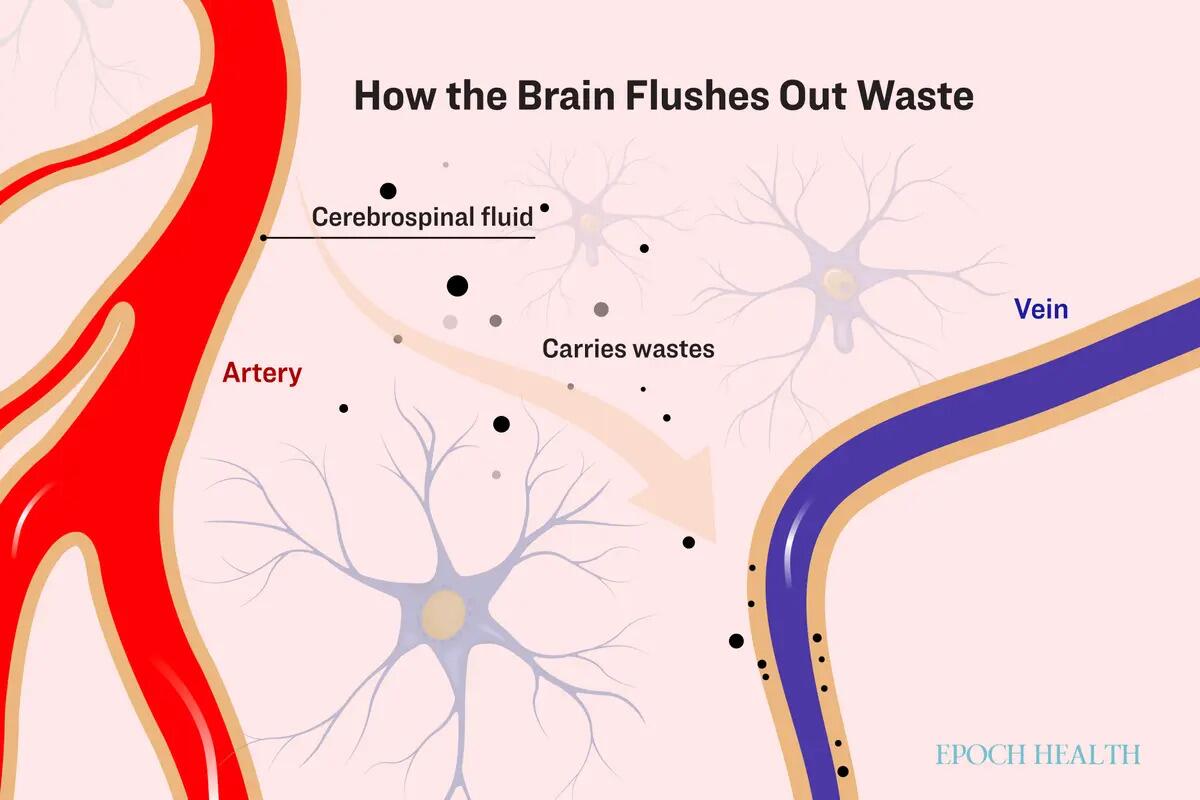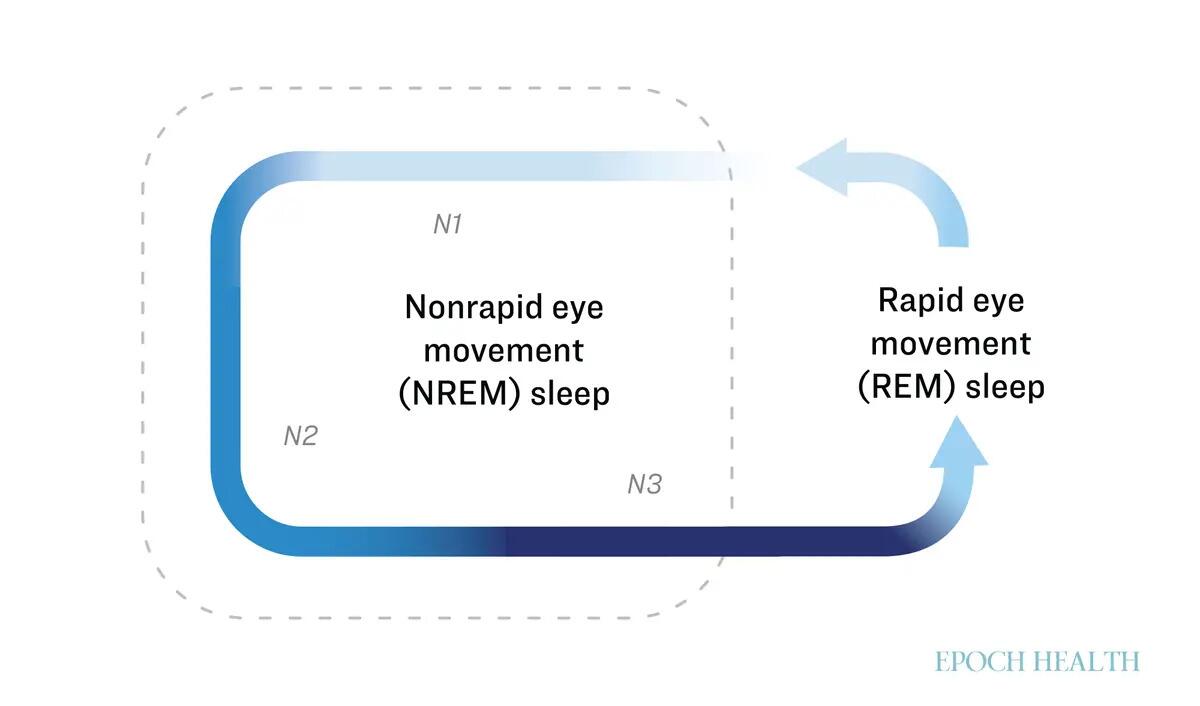By Flora Zhao via Epoch Times (emphasis on us),
When we fall asleep, the brain begins to clean up waste.
It works like a late-night laundry service, where all the water valves are open and the washing machines run at full capacity to remove dirt from piles of clothes by flushing sewage into the sewer.
The brain constantly produces various wastes, and if they are not cleaned in time, we will feel it. Signs can range from blurry and fatigue to experiencing cognitive impairment.
Fortunately, efforts can be made to optimize garbage collection at night.
Rinse off waste
The human brain is one of the most metabolically active organs, accounting for about 20 percent of the body’s total energy expenditure. Such high activity produces significant waste. Smaller by-products, such as carbon dioxide, urea and ammonia, disperse into capillaries and are purified through the bloodstream. Larger neurotoxic proteins – including beta-amyloid and tau, both of which are widely associated with an increased risk of Alzheimer’s disease – cannot be eliminated through the bloodstream alone due to their size.
Previously, it was believed that the brain lacked lymphatic system for removing waste and relied only on internal clearance.
However, in 2012, scientists discovered a special mechanism in the brain that is analogous to the lymphatic system and is capable of flushing large residues deeply from inside the brain. This system was called the glymphatic system, the portmanteau of the “glial” (referring to glial cells) and the portmanteau of the “lymphatic system”. It is also known as the pseudo-lymphatic system.

The enveloping of the arteries of the brain is a mantle-like structure in which cerebrospinal fluid flows through the space between the artery and its sheath. During sleep, the blood vessels of the brain narrow, increasing the space between the vessels and the sheath, which allows more cerebrospinal fluid to flow inside. As the arteries pulsate, cerebrospinal fluid is pumped through brain tissue, flushing out waste — such as beta-amyloid and tau proteins — from the deeper spaces between brain cells, eventually clearing it of the brain.
Deep sleep
“Waste removal processes in the brain hardly work while awake. It’s very much a process that takes place in our deep sleep phases,” Moira Junge, who has a PhD in health psychology and is chief executive of the Australian Sleep Health Foundation and an additional clinical associate professor at Monash University, told The Epoch Times.
Sleep is divided into two states: rapid eye movement (REM) sleep and nonrapid eye movement (NREM) sleep. NREM accounts for 75 percent of all sleep time and is further divided into three stages, N1, N2 and N3 – each reflecting a progressively deeper level of sleep.
During N3, brain waves are the slowest.
“It’s such a deep sleep that the outside environment doesn’t bother you easily; for example, you don’t hear a dog barking outside or hear your partner come to bed,” Junge said.
During sleep, the body moves through the stages sequentially, forming a full sleep cycle lasting about 90 minutes. Throughout the night, a person usually experiences four to five sleep cycles.

The glymphatic system becomes more active during sleep, especially during deep sleep, allowing for more effective waste cleansing, said psychiatrist Dr. Jingduan Yang, founder of the Yang Institute of Integrative Medicine in Pennsylvania.
In a mouse study published in the journal Science, the researchers used tracers to monitor changes in cerebrospinal fluid flow. They found that during sleep, the interstitial or interventional space expanded by more than 60 percent and the tracer inflow increased. Brain beta-amyloid clearance doubled during sleep (or under anesthesia) compared to wakefulness.
Accumulated beta-amyloid
Unfortunately, Americans sleep less today than ever before.
According to a Gallup December 2023 poll, 42 percent of Americans perceive that they are getting enough sleep. One in five people sleep less than five hours a night — up from just 3 percent in 1942.
The shorter duration of sleep can also be attributed to the fact that people go to bed more and more later. One study found that postponing bedtime by just one hour reduces total sleep by 14 to 33 minutes each night.
In addition to the fact that we go to bed later and sleep less, we also do not sleep well. According to the American Psychiatric Association, more than 50 million people in the United States suffer from chronic sleep disorders such as insomnia and sleep apnea.
These problems directly reduce and interfere with deep sleep, shortening the critical window during which the glymphatic system works with maximum efficiency. This, in turn, leads to an increased accumulation of waste in the brain.
People who reported less adequate sleep and more sleep problems had a higher amyloid load in areas of the brain sensitive to Alzheimer’s disease.
A 2021 human study found that even one night of sleep deprivation can impair the brain’s ability to clean up waste.
An earlier clinical trial showed that despite the expected relatively large interindividual variation in certain types of amyloid-beta levels, the average buildup of beta-amyloid from three morning samples of unlimited sleep was 6 percent lower than that of three evening samples.
In comparison, participants who stayed awake for 24 hours had levels of amyloid beta up to 75.8 picograms per milliliter higher. It showed that unlimited sleep reduced amyloid-beta proteins, but lack of sleep neutralized this effect. Moreover, the longer the duration of sleep — assuming it wasn’t excessive — the greater the reduction in beta-amyloid biomarkers.
Read the rest here…
























